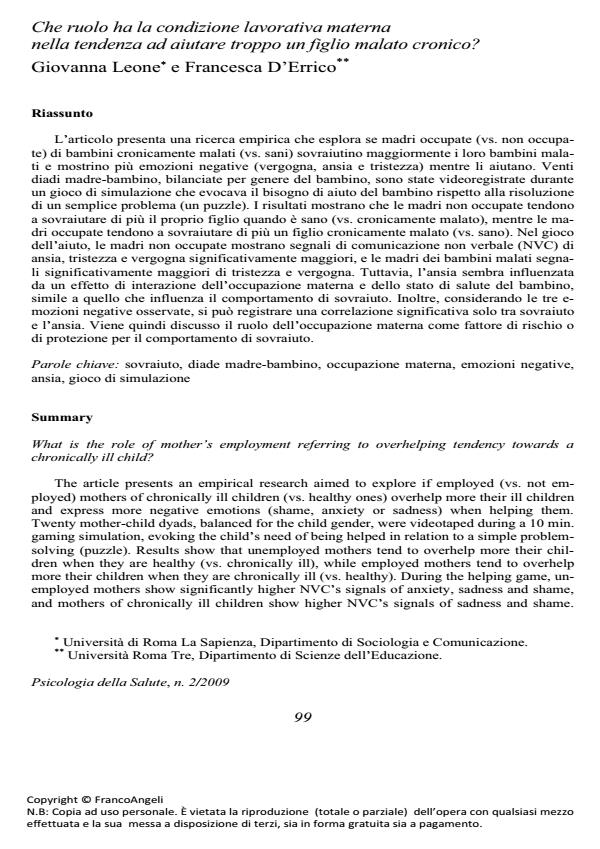Che ruolo ha la condizione lavorativa materna nella tendenza ad aiutare troppo un figlio malato cronico?
Titolo Rivista PSICOLOGIA DELLA SALUTE
Autori/Curatori Giovanna Leone, Francesca D'Errico
Anno di pubblicazione 2009 Fascicolo 2009/2
Lingua Italiano Numero pagine 20 P. 99-118 Dimensione file 116 KB
DOI 10.3280/PDS2009-002007
Il DOI è il codice a barre della proprietà intellettuale: per saperne di più
clicca qui
Qui sotto puoi vedere in anteprima la prima pagina di questo articolo.
Se questo articolo ti interessa, lo puoi acquistare (e scaricare in formato pdf) seguendo le facili indicazioni per acquistare il download credit. Acquista Download Credits per scaricare questo Articolo in formato PDF

FrancoAngeli è membro della Publishers International Linking Association, Inc (PILA), associazione indipendente e non profit per facilitare (attraverso i servizi tecnologici implementati da CrossRef.org) l’accesso degli studiosi ai contenuti digitali nelle pubblicazioni professionali e scientifiche.
What is the role of mother’s employment referring to overhelping tendency towards a chronically ill child? - The article presents an empirical research aimed to explore if employed (vs. not employed) mothers of chronically ill children (vs. healthy ones) overhelp more their ill children and express more negative emotions (shame, anxiety or sadness) when helping them. Twenty mother-child dyads, balanced for the child gender, were videotaped during a 10 min. gaming simulation, evoking the child’s need of being helped in relation to a simple problemsolving (puzzle). Results show that unemployed mothers tend to overhelp more their children when they are healthy (vs. chronically ill), while employed mothers tend to overhelp more their children when they are chronically ill (vs. healthy). During the helping game, unemployed mothers show significantly higher NVC’s signals of anxiety, sadness and shame, and mothers of chronically ill children show higher NVC’s signals of sadness and shame. Nevertheless, anxiety seem to be influenced by an interaction effect of mother’s employment and health status of child, similar to the one shown by overhelp behaviour. Moreover, checking for the three observed negative emotions, a significant correlation was found only between overhelping behaviour and anxiety. The role of mother’s employment as a risk or as a protection referring to the overhelping behaviour is discussed.
Key words: overhelp, mother-child dyad, mothers’ employment, negative emotions, anxiety, simulation game
Parole chiave: sovraiuto, diade madre-bambino, occupazione materna, emozioni negative, ansia, gioco di simulazione
Giovanna Leone, Francesca D'Errico, Che ruolo ha la condizione lavorativa materna nella tendenza ad aiutare troppo un figlio malato cronico? in "PSICOLOGIA DELLA SALUTE" 2/2009, pp 99-118, DOI: 10.3280/PDS2009-002007